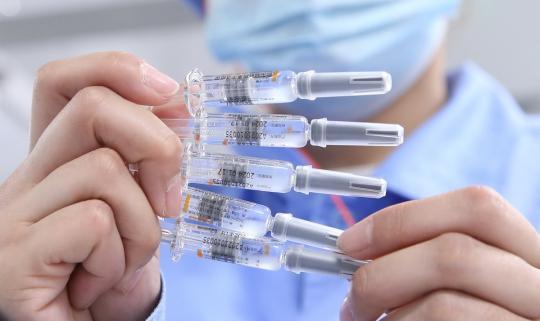
A staff member shows CoronaVac vaccine vials at Sinovac Life Sciences in Beijing. (Photo: China Daily)
Experiences accumulated from the development and export of COVID-19 vaccines will help bolster the presence of Chinese pharmaceutical, biotech and medical product companies on the world arena, business leaders and analysts said.
"The export of our COVID-19 vaccines helped us gain international recognition and credibility, which in turn contributed to the export of the company's other vaccine-related products," said Pearson Liu, director of brand management and public relations at Sinovac Biotech Ltd.
For example, since 2009, Sinovac has been promoting the clinical trials and registration of its inactivated vaccine against hepatitis A in South Korea. On Dec 29, the vaccine was approved by the local medical products administration, he said.
Currently, apart from the COVID-19 vaccine and hepatitis-A vaccine, Sinovac owns Enterovirus Type 71 vaccine, which prevents hand-foot-mouth disease, combined hepatitis-A and B vaccine, H5N1 influenza vaccine, among others.
"Through our experience of COVID-19 vaccine export, other vaccines developed by the company are expected to gain global acceptance and be exported to the outside world to help those in need," Liu said.
Feng Duojia, president of the China Association for Vaccines, said China's exports of self-developed COVID-19 vaccines fully deliver on its commitment to global community on making the vaccines a public good, and have provided substantial support to global prevention and control of the disease through proactive actions. Such actions are fully in conformity with its vision to build a global community of nations with a shared future for mankind.
He also said China is strengthening vaccine regulation to ensure quality and boost vaccine exports.
China now owns four vaccines that have passed the World Health Organization's assessment to get on its list of prequalified vaccines used by the United Nations and other agencies to decide which vaccine to purchase.
Currently, 20 Chinese vaccines have applied or plan to apply for the WHO prequalification process, and the multilateral agency is expected to conduct a new round of high-level assessment of China's vaccine regulation in 2021, Feng said.
Chen Qiulin, deputy director of the Health Industry Development Research Center at the Chinese Academy of Social Sciences, said exporting COVID-19 vaccines will help the Chinese companies concerned to accumulate valuable experience in, and deeper understanding of, global markets and international best practices.
Besides, Chinese vaccine producers can also burnish their global image and gain better customer recognition, he said.
Li Shanshan, a healthcare columnist at news website Zaker, said that in the process of going global, Chinese vaccine-makers will have more chances to study international markets and will gain experiences to export their vaccines. The industry has reached a new stage of development, she said.
One of the major challenges for Chinese vaccine manufacturers going global is to find acceptance overseas, Liu said.
"The fact that our COVID-19 vaccine received emergency use approval from countries like Brazil, Chile, Turkey and Indonesia can serve as a reference for other countries and regions. For instance, Brazil's federal drug regulator Anvisa's authorization would promote the vaccine's approval in other South American countries," he said.
Agreed Yin Weidong, chairman and CEO of Sinovac. "We hope our vaccine can protect more people around the world."
However, Chen warned that as COVID-19 vaccines are at the focus of worldwide attention, Chinese producers must be very careful at every step of the process involving production, storage and transportation, to ensure top quality of their products.


